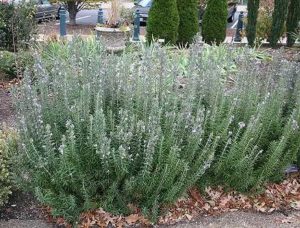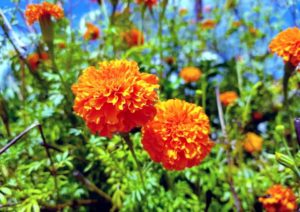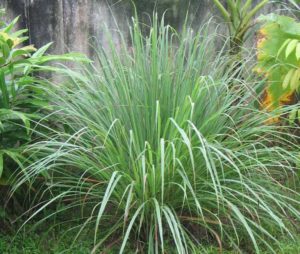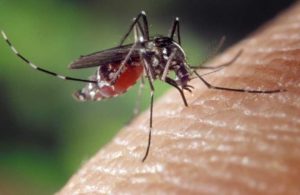With record breaking rainfall this years (over 11 inches in September alone), the mosquito population has voted north Dallas it’s #1 place to be this summer and fall. Over the years, mosquitoes have been guilty of transmitting many diseases including malaria, dengue, yellow fever, encephalitis, and more recently the West Nile and Zika viruses. Mosquitoes can also be blamed for heartworm in dogs. Mosquitoes are certainly an annoying summer pest, but they also clearly represent a potential health concern for our families and pets.
As garden designers, we are always looking at ways for plant installations to be purposeful: providing privacy, shade, facilitating drainage, etc. One of the most exciting functions of certain plants is their ability to attract and repel insects. Just as entire gardens can be designed to invite butterflies, so can entire gardens be created to repel mosquitoes.
Certain insects are attracted to or repelled by the aroma contained within a plants foliage or flower petals. In general, mosquitoes avoid aromas such as lemon, eucalyptus, rosemary, cinnamon, lavender or citronella. The sun will naturally trigger plants to release their natural oils and aromas. For a stronger repellent, you can also take the foliage or petals from any of these plants and crush them in your hands, rub them directly onto your skin or infuse them in water or oils to create a homemade insect repellent. You can use this as a guide when thinking about what plants might be the most effective to keep mosquitoes at bay. Here is a list of our top 5 recommendations for mosquito-repelling plants to use in your garden.
Rosemary

We love to plant rosemary wherever we can, especially in backyard landscaping surrounding a swimming pool. Often considered a perennial, due to our milder winter weather, Rosemary is actually a large growing evergreen shrub in our area. As opposed to most of the other mosquito-repelling plants which prefer warmer climates, Rosemary does very well in our winter weather. Its woody scent is lovely and repels not only mosquitoes, but cabbage moths and carrot flies. Rosemary can easily be grown in containers if you prefer, but in a garden bed, Rosemary can reach up to 4 feet wide. Knowing this, you will want to provide it with room to spread out. Rosemary loves the sun and is a very drought-tolerant plant. Rosemary of course has the added benefit of being used in the kitchen.
Lavender

Although it can be tricky to grow in North Texas due to our cold winters and clay soil, Lavender is one of the best (and most pleasantly aromatic) mosquito-repellents. A variety knows as “Phenomenal” has been tested at the Dallas Arboretum and proves to be the most successful in our area. Because Lavender needs excellent drainage, it will be the most successful in either a container or a raised garden bed where you can control the water flow as it leaves the surrounding soil. If you would like to try and plant Lavender in the ground, we would recommend adding sand to the existing clay soil or planting in sandy loam. The sand will help break up our clay soil and facilitate better water drainage. Lavender is possibly the most useful plant around. Most commonly known for its relaxing effect on the body, Lavender can also be used to treat skin conditions and bug bites.
Marigold

A common and vibrantly colored annual, Marigold are a great addition to the borders of your garden bed, vegetable garden or can be easily planted in containers. As for their mosquito-repelling ability, Marigold flowers contain pyrethrum, which is a compound found in many insect repellents. Marigold is a seasonal annual in our area, so plant to repel each year. However, don’t let any of the marigold petals go to waste…they are a fantastic resource for skin conditions. Providing antibacterial, anti-inflammatory and antifungal properties, Marigold petals (calendula) can be infused in hot water or oil to create a healing treatment for common skin maladies such as eczema or burns.
Basil

Another fantastic herb to plant to help keep mosquitoes at bay is Basil. All varieties of Basil have mosquito-repelling qualities. Basil is actually one of the few herbs you don’t have to crush or infuse in order to experience the benefits. Basil is another sun loving plant that is most comfortable in zones 9-11 (warmer climates). You can absolutely grown Basil in our zone 8, but would recommend planting it in a container to control access to the elements. Because Basil is so winter tender, plan to plant it as an annual.
Citronella

True citronella plants (Cymbopogon nardus or Cymbopogon winterianus) are actually grasses. If you happened to see “citronella” plant with very lacy foliage instead of grass blades, it is most likely a citronella scented geranium (which does not have the same repelling qualities). Citronella grass is a lemony-scented, perennial grass in zones 10-12. In our zone 8 region, Citronella grass should be planted in a container and treated as an annual. Citronella grass can be a very dramatic addition to any landscaping as it can grow between 5-6 feet tall. Citronella grass would be most at home in the jungles of Asia. Keep that in mind as it prefers more filtered sunlight and wants to be watered a bit every day.
Other plants known to have mosquito-repelling qualities are: Anything lemon scented (Lemon Balm or Lemongrass) or from the mint family (Mint, Peppermint, Spearmint, and Catnip).
In addition to planting mosquito-repellent plants, you should also practice good mosquito control in your yard so that the pests don’t get out of hand. The best thing you can do is prevent water from collecting and becoming stagnant, mosquitoes can lay hundreds of eggs even in a tiny spoonful of standing water. Address any standing water due to poor drainage.
